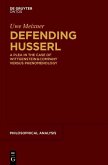The interest in a better understanding of what is constitutive for being a person is a concern philosophy shares with some of the sciences. The views currently discussed in evolutionary biology and in the neurosciences are very much influenced by traditional philosophical views about the self and self-knowledge, while contemporary philosophical accounts are not considered at all. Such an account will be given by an analysis of three focal elements of the use of the first-person pronoun. These elements have something to do with the faculty of taking a first-person point of view. The conceptual structure of this point of view is explained by comparing it with a second- and third-person point of view. There is an extensive discussion of various views about self-knowledge (Davidson, Bilgrami, Burge), and a new conception of authoritative self-knowledge is established. The first-person point of view is a reflexive attitude which includes various attitudes to one's past and future. These attitudes are necessarily or contingently de se. By bringing into focus the concern for one's future intentions will be discussed as an activity-based attitude, while there are other attitudes, like hope or fear, which are shaped by the acceptance of one's future situations which are not, or not completely under one's control. This view gives rise to a criticism of Frankfurt's notion of Caring.
Dieser Download kann aus rechtlichen Gründen nur mit Rechnungsadresse in A, B, BG, CY, CZ, D, DK, EW, E, FIN, F, GR, HR, H, IRL, I, LT, L, LR, M, NL, PL, P, R, S, SLO, SK ausgeliefert werden.









